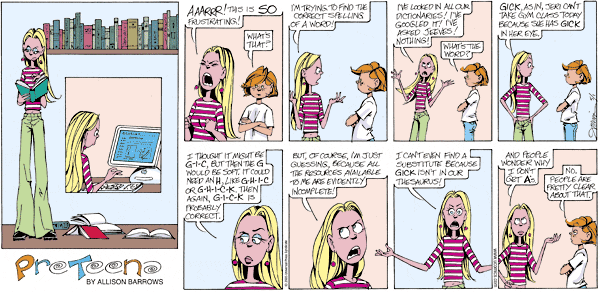May 13, 2005
The syntax/prosody interface: a cartoon version
Geoffrey Nathan emailed pointers to a couple of recent PreTeena cartoons about syntactic ambiguity in the context of a fifth-grade dance.
The first one (from May 4) is about decoration:

When Teena's friend asks "Do they need people to decorate?", she has in mind a structure analogous to "Do you want somebody to leave?" But Teena answers as if the structure were like that of "Do you want somebody to love?"
Translated into heavy English, the first version is something like "Do the dance organizers need people such that those people decorate the dance location?" while the second version is "Do the dance organizers need people such that the organizers decorate those people?".
Some people sometimes feel that this difference can be disambiguated by the placement of phrasal accent, e.g.
Do they need PEOPLE to decorate? vs.
Do they need people to DECORATE?
I think that I can get either reading with either accent pattern, but as Geoffrey pointed out, this is an instance of a problem that's been the subject of linguists' discussion for more than 30 years, starting with Joan Bresnan ("Sentence Stress and Syntactic Transformations", Language, 1971), and continuing with Dwight Bolinger ("Accent is predictable (if you're a mind reader)" and many others since.
There are many complex factors are interacting here -- the syntactic structure and the discourse context among others -- and intuitions about stress, accent and intonation are not very reliable. As a result, the nature and source of the interaction between prosody and meaning in such cases remains controversial. Now that it's possible in principle to do studies based on thousands of hours of transcribed natural speech, it may be time to look at these questions in a new way.
The second cartoon (from May 6) is about compliments:

Here the ambiguity is more straightforward, and so is its relationship to prosody.
Finally, this Sunday strip has no connection to syntax or prosody, but does highlight the inadequacy of modern lexicography:
